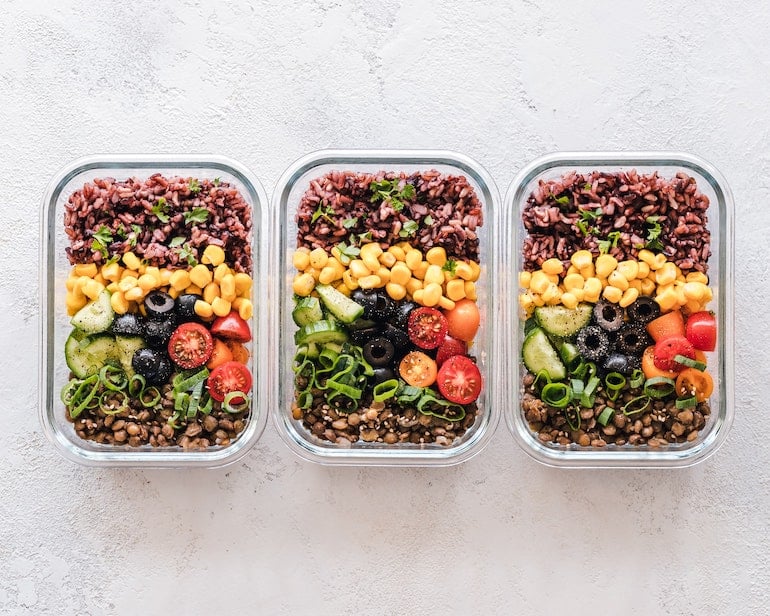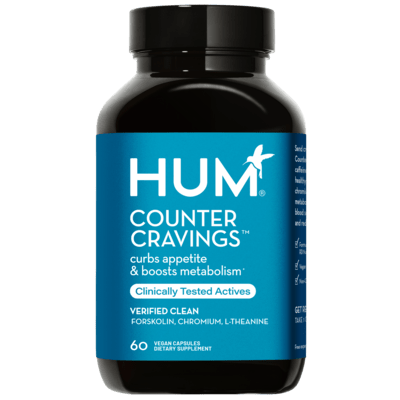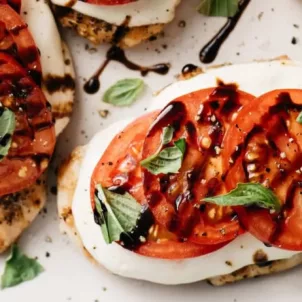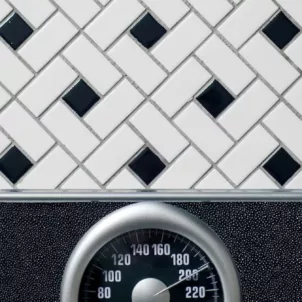At HUM, we understand weight loss, dieting, exercise, and body image are all sensitive topics that can be triggering for some. We’ll never tell you that you need to lose weight, go on a certain diet, or exercise a certain way. That said, if your goal is to lose weight, we support you. We’re here to give you science-backed tools to do so in a safe, healthy way.
Information about the best way to lose weight and how to lose fat, specifically, is constantly changing. New diets, trends in eating, and forms of exercise claiming to be the answer to your weight loss woes can make it even more confusing. We dove into the latest science of how to lose weight fast, including some of the best weight loss tips for women.
Weight loss: Even the mere mention of it can send a person into a downward spiral of confusion and stress overload. It doesn’t help that it feels like the science of weight loss is always changing. A few decades back, all fat was demonized—but we now know that the right kinds have proven benefits for metabolism, satiety, and many other far-reaching aspects of health. Fad diets and trends (think: juice fasts, cleanses, etc.) still gain steam every now and then… but often leave you feeling hangry and aren’t beneficial for long-term, sustainable weight loss. There’s also exercise to consider: Does it truly rev up weight loss, or do your food choices always reign supreme?
It goes without saying that weight loss is a sensitive topic. We’re certainly not here to tell you that you need to lose weight. But if you’d like to shed a few pounds, the goal should always be to make the journey healthy, sustainable, and founded on legit principles. To support your goals (and, ahem, bypass the BS), we spoke to experts about the latest science of weight loss and tried-and-true weight loss tips for women.
Weight Loss Mythbusting

Before we dive into weight loss tips that actually work, it’s important to dispel a few myths that are all too common.
“You Can ‘Cancel’ Out Bad Choices”
If you’ve ever heard that you can “even the score” between healthy and not-so-healthy dietary habits, you’ll need to ditch this way of thinking. “If you eat a cupcake and exercise 30 minutes to work it off, it is not a real exchange. What we put into our bodies and how we exercise do not ‘cancel’ each other out,” explains Jennifer Maeng, MS, RD, LD, CDN, CNSC, a clinical and culinary registered dietitian and founder of Chelsea Nutrition in NYC and Miami. In short, she says that you can’t manipulate diet and exercise in this way—for the sake of losing weight or supporting your greater health. This way of thinking can also lead to disordered eating patterns and hyperfixation on food—neither of which are healthy.
“Weight Loss Is As Simple As Calories In and Calories Out”
While your body does need to be in a calorie deficit to lose weight, it’s not the only factor involved in weight loss. “There are so many different factors that play a role in weight loss,” Maeng says. “For example, those with hormonal imbalances may experience difficulties with weight loss than those without.” (Not to mention the hormonal imbalances that are part of women’s monthly cycles—and eventually the wild ride that is menopause.) Of course, there are additional considerations that impact weight that go beyond calorie counting and burning, including but not certainly limited to blood sugar balance, sleep habits, and underlying medical conditions. Without addressing other aspects at play, being in a calorie deficit may not help you lose weight.
“Carbs Are the Enemy”
“Carbohydrates are one-third of the necessary macronutrients—the other two being protein and fat—that our bodies require for survival,” Maeng emphasizes. Yes, highly processed, refined carbs (such as those in pastries and sugary cereals) are low in nutrients and can contribute to weight gain and additional health complications. But on the flip side, Maeng gives fiber-rich whole grain carbs the green light. “Complex carbohydrates help with increasing satiety, regulating bowel movements, lowering cholesterol, and improving the gut microbiome overall,” she explains. All of these benefits will work to your benefit for weight loss and beyond.
If you restrict your intake of carbs or cut them out completely, Maeng says that you’ll likely experience weight loss… but not for long. “When people eliminate carbs from their diet, they typically soon experience a ‘quick’ few-pound weight loss that is simply water weight, but then their weight will plateau,” she explains. When you carry out this restrictive dietary pattern over time, she warns that you’ll “end up missing out on important nutrients and using glucose as your energy sources—ultimately incorrectly rewiring our normal processes of metabolism.”
The Emerging Science of Weight Loss

While the above examples of weight loss methods are on the way out, science is always evolving, with research revealing new ways to improve weight loss success. Maeng shares a few areas of research that particularly pique her interest.
Gut Balance Promotes Weight Loss (and Vice Versa)
Gut health is influential across countless areas of health and wellness—weight loss included. For instance, Maeng cites a 2020 study published in the peer-reviewed journal Current Developments in Nutrition, in which participants who had a healthy baseline gut microbiota composition were significantly more likely to have a decrease in waist circumstance after undergoing a weight loss protocol. Moreover, according to a 2022 meta-analysis published in Gut Microbes, “Increasing weight loss is positively associated with increases in gut microbiota α-diversity and reductions in intestinal permeability.”
In other words, a healthy gut can predict better outcomes for weight loss and body measurements—and losing weight can, in turn, enhance gut diversity and reduce the chances of struggling with leaky gut syndrome. (Stay tuned for specific tips to get your gut right.)
Weight Loss Requires Sustained Behavioral Changes
Findings from the National Weight Control Registry at Brown Medical School, the largest prospective study of people to date who have successfully lost weight and kept it off for good offer insight into what it takes to keep weight off in the long run. This 10-year observational study evaluated self-reported results from 2,886 participants (78 percent female, with a mean age of 48 years) who lost at least 30 pounds and maintained their results for a year or more.
Researchers found several commonalities that contributed to weight loss and maintenance success:
- 90 percent exercised one hour daily (on average)
- 78 percent ate breakfast daily
- 75 percent weighed themselves at least once weekly
- 62 percent watched no more than 10 hours of TV weekly
Sustainable and successful weight loss is possible if you maintain healthy habits across the board—which includes but isn’t limited to diet, physical fitness, and consistently (though not obsessively!) tracking your progress.
7 Weight Loss Tips for Women That Actually Work

So, what is the best way to lose weight and keep it off? Here’s how to lose weight fast and for good using the latest science.
1. Understand Your Why, Then Set Goals
It’s essential to understand why you want to lose weight in the first place, says Maeng. She shares a few helpful prompts to get started:
- Do you want to feel stronger during exercise, gain more muscle mass, or have more energy throughout your daily activities or with your family?
- Do you want to address (or avoid) health issues?
- Do you want to gain mental clarity, happiness, and manage stress better?
“By eating whole foods to nourish your body and help support regular functions, these are the types of improvements you could see in your life,” she explains. “But it is up to you to decide your biggest motivating factor.” From there, she suggests tailoring your weight loss plan and setting goals, which can motivate you even further to see the journey through.
Tip: Our brains love the thrill of a reward (hello, dopamine!), so if you conquer a weight loss goal—however big or small—be sure to celebrate your win with a fun treat or celebration of some sort. “Non-food motivating factors are a great tool. Treat yourself to something you love (a manicure or a movie) if you’ve had a successful week,” Maeng suggests.
2. Plan Out Your Meals in Advance
Maeng also advises meal planning. While it may seem daunting to think about what you’re going to eat days in advance, she encourages everyone to shake themselves out of an all-or-nothing mindset. “Meal planning really comes down to planning options for food that fit into your specific lifestyle and behaviors,” she says. This can take the stress out of daily cooking, which encourages you to cook more at home. It also helps you avoid the take-out trap on busy days. Looking for ideas? Check out the healthy meal ideas dietitians swear by.
3. Work with a Dietitian
If you’re serious about weight loss (as well as in the market for additional wellness wins), Maeng recommends enlisting the help of a dietitian.
“An RD will incorporate your food preferences and create a menu you actually look forward to—and therefore are more likely to adhere to,” Maeng continues. Plus, she says that RDs can also help you discover:
- The right food brands for your needs
- What to eat while traveling
- How to order food and drinks while dining out/in social situations
“[Beyond] counseling, dietitians also provide accountability, which is important to keep clients motivated and help them stay on track to achieve their wellness goals,” she adds. In turn, this partnership can promote weight loss and a healthier relationship with food overall. Published in 2019, a meta-analysis of randomized controlled trials even found that “six studies found a significant intervention effect for the dietitian consultation” for those aiming to lose weight. As the saying goes, teamwork makes the dream work. (Psst: HUM Nutrition subscribers get free access to a dietitian to answer questions and provide personalized supplement recommendations.)
4. Be Good to Your Gut
A healthy gut is crucial for weight loss. While friendly bacteria via probiotic supplements and fermented foods can help to optimize gut health, Maeng says that you’ll also want to promote gut balance and a generally healthy lifestyle by:
- Eating high-quality, nutrient-dense foods
- Limiting alcohol intake (try mindful drinking instead)
- Finding healthy ways to manage stress
- Discovering your unique food intolerances
- Understanding how your medications can impact your gut
5. Curb Cravings with Supplements
Of course, you should prioritize healthy food choices first and foremost—whether or not you want to lose weight. However, it can help to level up your supplement game to achieve a specific goal (such as weight loss) and overcome certain obstacles standing in your way of achieving it (like cravings for sweets and treats). If you feel like cravings are getting the best of you and end up derailing your weight loss progress, consider supplementing with HUM’s Counter Cravings. The caffeine-free blend packs chromium, seaweed extract, and L-theanine to promote balanced blood sugar levels, reduce cravings, boost metabolism, and support healthy body weight.
6. Exercise Regularly
“Exercise is great for muscle density, mood, the immune system, insulin resistance, hormones, sleep, and much more,” says Maeng. In other words, working out won’t only keep your body fit, but also improve areas of health that directly influence your ability to lose weight and keep it off. In fact, a 2019 study published in the journal Obesity found that participants who lost a significant amount of weight (about 58 pounds, on average) credited their weight maintenance and energy balance over the years to moderate-to-vigorous workouts.
While Maeng generally recommends weight training to her clients, she says that it’s more important to understand your readiness and barriers and modify your fitness regimen accordingly. She advises starting with the type of exercise that you feel most comfortable with—and, you know, actually enjoy. It could be walking around the block, swimming, yoga, HIIT training, or anything else that gets your body moving.
7. Avoid Rapid Weight Loss Methods and Yo-Yo Dieting
Though it can be exciting to see the numbers on your scale trending downwards, Maeng emphasizes how important it is to take a slow and steady approach to losing weight. “Weight loss should be at most one pound per week,” she explains. “Any more than that and it is not sustainable for our bodies and metabolism, and you will notice the yo-yo [effect]—likely because the method you are trying is not sustainable.”
On this note, she advises not falling prey to toxic elements of diet culture, which often glorify quick fixes and fad fasts—not to mention typically unattainable standards for body sizes and shapes. Instead, she recommends checking in with yourself to ensure that you maintain:
- Adequate energy levels
- Low stress levels
- High-quality sleep
- An overall good quality of life
“Work towards small, achievable goals consistently,” she continues. “As a dietitian who has helped numerous clients lose weight, I am here to tell you that consistency always wins over perfection.”











